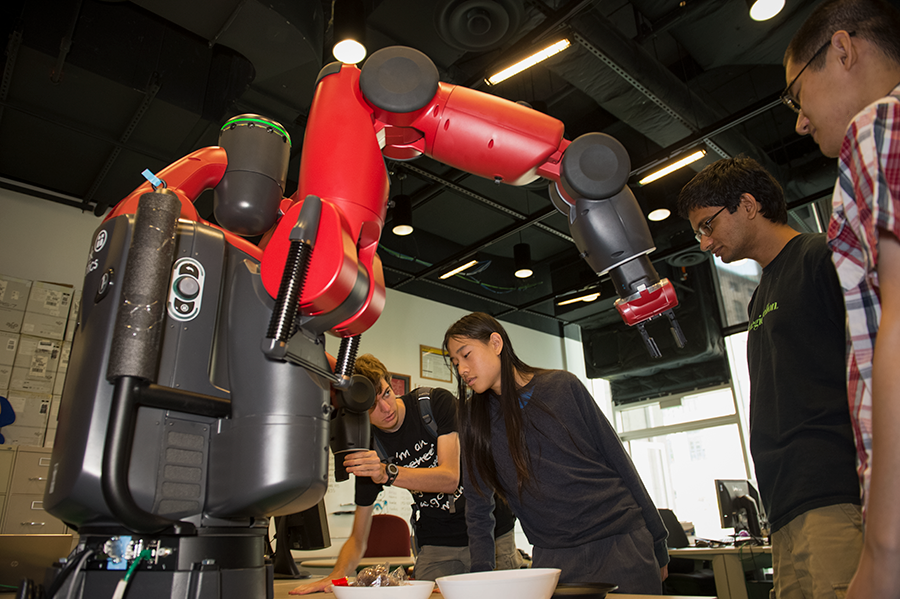
R.K. Mellon Foundation and Carnegie Mellon: More than 50 Years — and Counting — of Groundbreaking Innovations
New home for advanced robotics manufacturing research and development will lead transformation of industry, new chapter in Pittsburgh renaissance
Inside the steel shell of an abandoned steel mill along the Monongahela River, a high-tech facility heralding a new era for manufacturing in Pittsburgh is rising — just the latest landmark project in the more than 50-year relationship between Carnegie Mellon University and the Richard King Mellon Foundation.
The November groundbreaking for the development of Hazelwood Green as the home of the Advanced Robotics for Manufacturing (ARM) Institute and the Manufacturing Futures Initiative (MFI) had its genesis when the R.K. Mellon Foundation partnered with the Heinz Endowments and the Claude Worthington Benedum Foundation to buy the mill site in 2002, clean up the brownfield and seek new development opportunities. Over a number of years, the partners worked diligently to create a future for the property that creates opportunity for residents of the surrounding communities, promotes diversity and fosters economic sustainability.
Along with its leadership role in the property, the R.K. Mellon Foundation seeded the project with a $20 million gift to CMU to catalyze the ARM Institute, initially founded at CMU but now operating as an independent nonprofit; support the new facility at Mill 19; and launch MFI. That seed grant played a major role in ARM winning more than $250 million from the U.S. government and other partner organizations in January 2017. Included in that transformational funding was an $80 million grant from the U.S. Department of Defense to create an ecosystem that will speed the movement of industrial robotics technologies into commercial use, while ensuring workers get the training they need to benefit from these advanced technologies and compete with manufacturing abroad.
A Partnership Begins
The ARM initiative is hardly the first time that the R.K. Mellon Foundation has been ahead of the curve, funding projects at Carnegie Mellon that anticipate society’s needs and providing the university with the resources to tackle those issues. With more than $109 million in support since 1986, the organization is CMU’s largest foundational partner, providing early funding for projects that have proven to be among the most important to the university.
“The R.K. Mellon Foundation has been an invaluable partner with CMU since the early 1960s, and has played an integral part in projects large and small that have changed our region and the world for the better,” said Farnam Jahanian, president of Carnegie Mellon. “Their bold and visionary investments in CMU show their commitment to fostering a competitive future and the highest quality of life for those in the Pittsburgh region.”
The 70-year-old foundation was created by Richard King Mellon, president and chairman of Mellon Bank, and first partnered with CMU in 1964. That year, Mellon and his wife, Constance Prosser Mellon, made a gift to CMU’s nascent Computer Science Department, a program that has soared to become CMU’s world-leading School of Computer Science.
Four years later, their interest in contemporary issues led to a second gift of $10 million to establish the School of Urban and Public Affairs (SUPA), a graduate school focused on the complex challenges affecting the country’s urban centers. From those first 13 enrolled students in 1970, SUPA has grown and evolved into the Heinz College of Information and Public Policy, housing the School of Public Policy and Management and the School of Information Systems, which boasts more than 10,000 graduates today.
Those gifts were just the beginning of what would become a long partnership between the two organizations. Over the years, the R.K. Mellon Foundation supported several revolutionary programs at CMU and funded new university and student initiatives. In 2007, the foundation gave $25 million to support CMU’s work in the life sciences, at the time the largest private foundation grant in the university’s history. The grant created the Life Sciences Competitiveness Fund, which supports the hiring of faculty, construction of new labs and student support. It also created a Presidential Scholars Fund to support graduate students focusing on life sciences fields, such as computational biology, medical robotics and biomedical engineering.
R.K. Mellon has also been a leader in advancing research and discovery within the university. In 2013, the foundation galvanized the university’s efforts in energy-related research with a $30-million grant to CMU. This gift boosted the Wilton E. Scott Institute for Energy Innovation and was instrumental in the construction of the Sherman and Joyce Bowie Scott Hall. This support from R.K. Mellon fuels energy research projects, faculty and student recruitment, and the Institute’s efforts to create, use and deliver energy more efficiently and sustainably.
“When we look at opportunities for the region, we assess our community’s strengths and try to determine how they best intersect with growing national or international business trends,” said Scott Izzo, director of the R.K. Mellon Foundation. “CMU’s research and programs in robotics and advanced manufacturing are exemplary and will help shape the future and competitive position of business in this country.”
The foundation has supported additional projects over recent years that promote economic and technology advancements, such as a display at the Pittsburgh International Airport highlighting Pittsburgh’s science, technology and innovation renaissance; research into intelligent assistive technology for individuals with disabilities; assessments of alternative fuel possibilities for Port Authority buses; and the creation of low-cost water quality monitoring devices, among many others.
“Carnegie Mellon and Pittsburgh are extraordinarily lucky to have benefited from the R.K. Mellon Foundation’s generosity, which seeks to revolutionize higher education, economic development and opportunity, and our region’s importance to the world,” said Jim Rohr, chair of CMU’s board of trustees. “We are enormously grateful to count them as one of our longest and most important partners, and look forward to what we will achieve together in the coming years.”